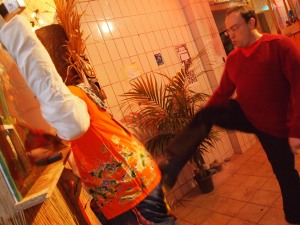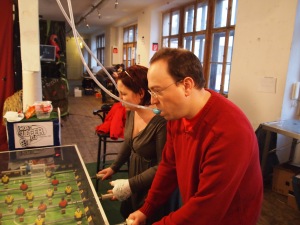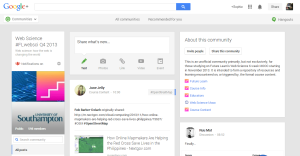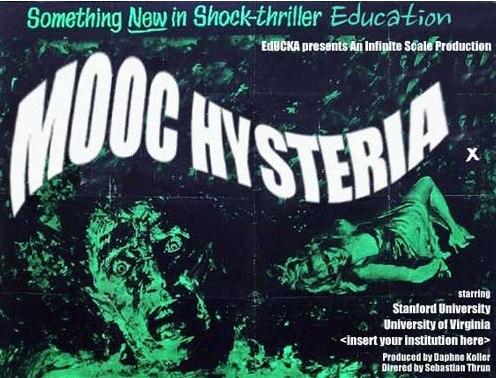Weil’s so schön war und es sowieso immer gut ist, festzuhalten, was es alles nur in Wien gibt, wird hier ausführlich berichtet von den Robotern, die Drinks für mich gemixt haben.
Vom 1.-4.12.2011 fand im leicht o’gfuckten Ragnarhof im 16. Bezirk die sogenannte “Roboexotica” statt, ein Festival, das Robotern gewidmet ist, die im weitesten Sinne etwas mit Alkohol-Bezug machen können. Mehr braucht man dazu eigentlich nicht zu sagen, diejenigen, denen das Konzept zusagt, sind von dieser Erklärung bereits hin und weg. Diejenigen, denen das Konzept nicht zusagt, werden die Schönheit dieser Kombination nie begreifen.

Und weil ich ja zum Glück Freunde für jeden Blöd- und Schlausinn habe, suchen wir also am Sonntag Nachmittag, dem letzten Tag des Festivals, zu dritt den Ragnarhof. Der sieht ziemlich genau so aus wie eine Location, an der man Lust bekommt, an einem Roboter herumzubasteln. Schon als wir begrüßt werden, beginne ich zu bereuen, dass wir erst heute da sind und nicht schon gestern. “Schauts glei amoi aufi, do is am ehesten was los. De meisten Betreiber vun die Roboter san nämlich nu betrunken.” Also, nach oben, in den “Ausstellungsraum”. Und da haben wir dann auch gleich die erste Begegnung – mit dem Tiki-Gott mit großen Augen und einem großen Mund. Wir bekommen ein Blasrohr in die Hand gedrückt und müssen versuchen, eines der großen Augen oder den großen Mund zu treffen. Wenn ja – “und ja, nach spätestens 20 Minuten hat es noch a jeder geschafft”, dann fließt Cola-Rum oder Rum-Cola aus einem Schlauch in einen Becher. Bei mir ist es Rum mit einem Schuss Cola, es ist noch nicht einmal halb vier am Nachmittag, aber wie oft kommt man schon in die Situation, sich einen Drink mit einem Blasrohr zu verdienen.

Die nächste Begegnung findet statt mit einem weiteren Gott, der neonfarbig in einem dunklen Raum regiert. Vor ihm muss man tanzen, und wenn man sich lächerlich genug gemacht hat, wird man belohnt mit einem Stamperl Pfirsichspritzer. Ich muss zugeben, hier hat Daniel die ganze Arbeit geleistet. Wir unterhalten uns ein bisschen mit einem der Kreatoren des Gottes. Und erfahren, dass es an der FH Joanneum eine Lehrveranstaltung gab, in der Einreichungen für die Roboexotica geplant und gebaut wurden. Die alkoholspuckenden Roboter bringen also auch noch ECTS-Punkte ein. (Und andere Leute schreiben 30-seitige Seminararbeiten in Word.)

Die anderen Roboter müssen alle gereinigt und / oder repariert werden (und wieder bereue ich, dass wir nicht schon gestern da waren). Kurzer Ausflug nach unten also, wo uns einer der Organisatoren noch ein paar schöne Dinge zeigt. Einen Roboter zum Beispiel, der vegane White Russians mixen sollte. Leider, so werden wir informiert, ist da “gestern in der Nacht jemand dagegengefallen”. Jetzt ist er die nächsten 3615 Minuten einmal außer Betrieb (der Roboter, natürlich). Ein anderer Roboter sollte Palatschinken mit Vodka-Erdbeermarmelade machen können. Und ein Vodoo-Roboter spuckt Nußschnaps.

Im Nebenraum wartet die nächste Sensation: Der unsympathischste Roboter, den man sich vorstellen kann, ruft einem Beleidigungen auf Englisch, Italienisch und Südtirolerisch nach (“Wenn ich jetzt in Zukunft das Wort Arschloch hör, dann kann ich mir wenigstens ein Gesicht dazu vorstellen: deins.” “Wenigstens a Hoiz hast vor da Hittn.”). Und dann…ja dann darf man den Roboter genau dorthin treten, wo man normalerweise nicht hintreten darf. Und wenn man es fest genug gemacht hat, beginnt der provokante A**hole-Bot so richtig jämmerlich zu jaulen…und richtet einem dann auch noch gleich ein Cappy-Vodka her.


Das war aber noch nicht das Schönste.
Wieder nach oben…und ja, der Wuzzel-Bot ist jetzt fertig gereinigt und mit Bier befüllt. Wuzzeln kann ich ja eigentlich prinzipiell nicht, und außerdem habe ich meine linke Hand noch immer in Gips. Und es ist immer noch Sonntag Nachmittag und damit wahrscheinlich eigentlich eher nicht die Zeit, zu der man sich einen Bierschlauch in den Mund stecken lassen sollte. Andererseits…
Die Regeln sind einfach. Man spielt in Zweierteams. Wenn man ein Tor schießt, dann strömt durch die Schläuche Bier in die Münder des erfolgreichen Teams. Beziehungsweise in unserem Fall, der Sonntag-Nachmittag-Variante, in die Münder des weniger erfolgreichen Teams, um die Dynamik aufrecht zu erhalten. Und das insgesamt sieben Mal.

Das war aber auch noch nicht das Schönste. Das Schönste, glaube ich, war der Grog-Puking Pirate, ebenfalls ein ECTS-bringendes Projekt der FH Joanneum. Ein alter Pirat sitzt verdächtig tief über einen Kessel gebeugt. Wir müssen uns Jack-Sparrow-Hüte aufsetzen, bekommen einen Becher in die Hand gedrückt, und singen und schunkeln vor dem Piraten (“What shall we do with the drunken sailor”, unser persönlicher Gossenhauer). Bis es dem Piraten dann hochkommt und man den Strom Grog, der aus seinem Mund kommt, mit dem Becher auffangen darf. Ganz warm und äußerst wohlschmeckend (selbst mit dem Wissen, dass der Grog, der im Kessel verbleibt, irgendwann einfach wieder in den “Magen” des Piraten geleitet wird.

Auch schön anzuschauen (und vor allem die qualitativ besten Cocktails produzierend) ist Melmacc, benannt nach ALF’s Heimatplaneten. Melmacc wird von Nerds mit Keyboard und Maus betrieben und hat sogar eine Facebook-Seite. Man wählt aus einem guten Dutzend Cocktails einen aus. Auf dem wunderschönen Holzgestell fährt der Becher zu den entsprechenden Getränken und bekommt am Schluss von einem Arm einen Strohhalm mit Etikett, auf dem der Name des Getränks steht. Wohlschmeckend, sehr großzügig dosiert und zum Preis von 2 Euro 50.



Mittlerweile hat sich die Bude auch schon einigermaßen gefüllt. Ich bereue jetzt etwas weniger, dass wir nicht am Vorabend gekommen sind, wo etwa 1000 Leute um die Gunst der etwa 20 Alko-Bots gekämpft haben. Man muss auch anmerken, dass wir uns gesprächsthematisch der Situation recht brav anpassen, und das ist hauptsächlich Mario zu verdanken, der das Gespräch geschickt in Richtung Cloud Computing und NoSQL zu treiben weiß.

Schön war’s. Leider dauert’s ein ganzes Jahr bis zur nächsten Roboexotica, aber da muss man eben durch. Manche Dinge gibt’s eben nur in Wien.
























